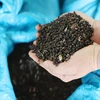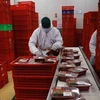In recent years, the cacao-growing area in the southern province of Ben Tre in particular and in the whole country in general tends to increase, according to the Communist Party of Vietnam Online Newspaper.
Cacao production in Ben Tre has been constantly growing both in quality and quantity.
At a conference about sustainable cacao development recently held in Ben Tre province, Deputy Head of the Department of Crop Production under the Ministry of Agriculture and Rural Development Nguyen Van Hoa affirmed that the demand of the world market for cacao is great and this intercrop in coconut gardens and orchards is the most relevant option at present.
Ben Tre is one of the leading provinces nationwide in term of cacao-growing area. A major cacao in Ben Tre province intercropped in coconut groves have helped farmers to double their income in the same area. Particularly, the cacao in Ben Tre province have been purchased by many large groups and businesses to produce chocolate such as Cargill and Puratos Grand Place.
However, cacao is still a new crop and has many pestilent insects; planting technique and preliminary treatment are quite complex and new for farmers. Moreover, the system of purchasing and preliminary treatment have not been built synchronously causing many difficulties for farmers.
To develop cacao sustainably for the Mekong Delta in the future, localities should implement synchronous solutions from research, selecting seed cacao, transferring techniques of planting, care, and pestilent insect prevention for farmers.
According to the Ben Tre provincial Department of Agriculture and Rural Development, the province has nearly 5,000 hectares of cacao. The low selling price discouraged farmers so they massively cut down cacao in late 2012 and early 2013 to change new plants such as green grapefruit, orange and lemon.
At present, it has 127 points to purchase and primary process cacao for farmers.
The cacao plantation area in Vietnam has increased to 22,000ha from 9,000ha in 2007, providing 5,000 tonnes of dried beans in 2013. The country plans to have 50,000ha under cacao cultivation and produce about 100,000 tonnes of fermented beans by 2020.-VNA
Cacao production in Ben Tre has been constantly growing both in quality and quantity.
At a conference about sustainable cacao development recently held in Ben Tre province, Deputy Head of the Department of Crop Production under the Ministry of Agriculture and Rural Development Nguyen Van Hoa affirmed that the demand of the world market for cacao is great and this intercrop in coconut gardens and orchards is the most relevant option at present.
Ben Tre is one of the leading provinces nationwide in term of cacao-growing area. A major cacao in Ben Tre province intercropped in coconut groves have helped farmers to double their income in the same area. Particularly, the cacao in Ben Tre province have been purchased by many large groups and businesses to produce chocolate such as Cargill and Puratos Grand Place.
However, cacao is still a new crop and has many pestilent insects; planting technique and preliminary treatment are quite complex and new for farmers. Moreover, the system of purchasing and preliminary treatment have not been built synchronously causing many difficulties for farmers.
To develop cacao sustainably for the Mekong Delta in the future, localities should implement synchronous solutions from research, selecting seed cacao, transferring techniques of planting, care, and pestilent insect prevention for farmers.
According to the Ben Tre provincial Department of Agriculture and Rural Development, the province has nearly 5,000 hectares of cacao. The low selling price discouraged farmers so they massively cut down cacao in late 2012 and early 2013 to change new plants such as green grapefruit, orange and lemon.
At present, it has 127 points to purchase and primary process cacao for farmers.
The cacao plantation area in Vietnam has increased to 22,000ha from 9,000ha in 2007, providing 5,000 tonnes of dried beans in 2013. The country plans to have 50,000ha under cacao cultivation and produce about 100,000 tonnes of fermented beans by 2020.-VNA



















